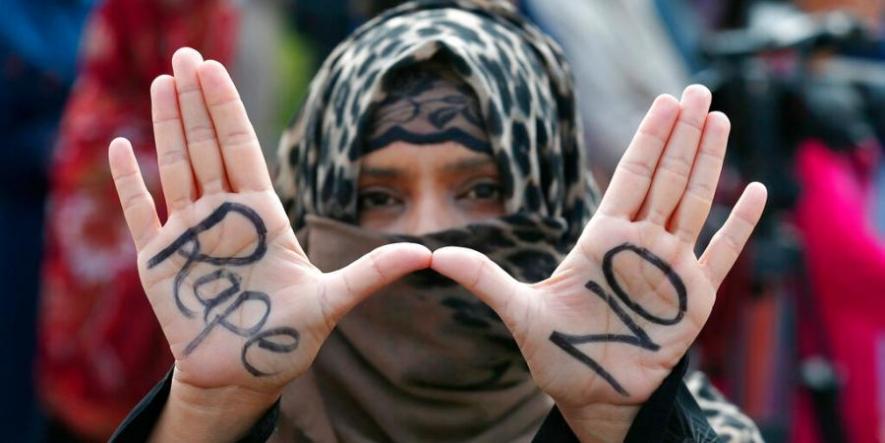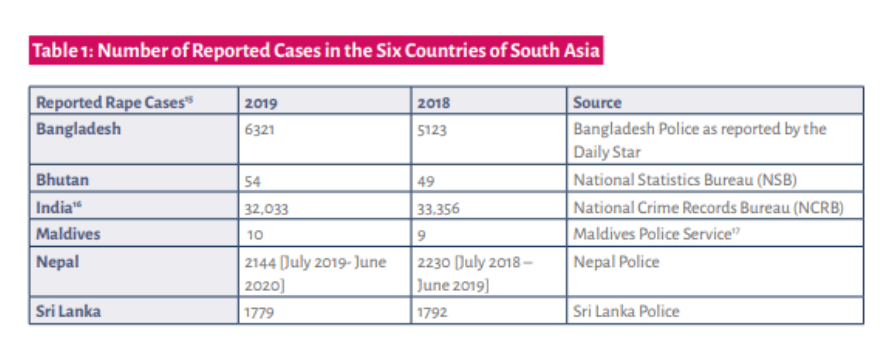Study Says Number of Rape Cases May Have Increased During the Pandemic

Image Courtesy: AP
Survivors of rape and their families in India and other South Asian countries struggle with unbiased access to justice, said a report released on Wednesday.
The report, titled 'Sexual Violence in South Asia: Legal and Other Barriers to Justice for Survivors', was co-authored by the NGOs Equality Now and Dignity Alliance International. India was among six South Asian countries where there is an urgent need for the government to address sexual violence, improve access to justice for the survivors, and end impunity for perpetrators. According to the report, the ongoing pandemic has exacerbated the crisis of sexual crimes related data across the world. It focuses on six countries – Bangladesh, Bhutan, Nepal, Maldives, India and Sri Lanka.
“India witnessed a significant drop in the number of reported rape cases during the pandemic. As per police statistics, there was a total of 23 rape cases reported in the state of Delhi between March and April, 2020, compared to 139 during the same period in 2019. However, experts suggest that this is barely a true representation of the reality, rather the number of cases may have actually increased but women are unable to report because of the presence of perpetrators at home during the lockdown,” it said.

The report analysed the gaps in the laws and policies on sexual violence and assesses the role and response of the criminal justice system in addressing the issue of sexual violence against women and girls in South Asia.
“In South Asia, there is an absence of official data which adequately captures the actual number of sexual violence incidents which take place. However, qualitative reports suggest that survivors of sexual violence have faced numerous problems in accessing justice, including not having their cases recorded by the police, prosecuted or successfully adjudicated,” it said.
The report added that in the year 2020, one that will forever be tarred by association with the COVID-19 pandemic, “women experienced increased vulnerability due to several factors such as lack of access to police stations (particularly during lockdowns), attitudes of police officers (some of whom turned away survivors who sought to report), reduced working of courts which led to delays in trial proceedings, pressure to compromise cases and generally impeding access to justice for survivors of sexual violence.”
However, among the six countries, India is the only country among the six where the definition of rape takes into account a broad range of coercive circumstances. Indian law presumes the absence of consent on the part of the victim in a broad range of circumstances, such as rape by an individual in a position of authority, custodial rape, rape by a relative, guardian, teacher, person in a position of trust, or person in a position of control or dominance over a woman. “However,” the report pointed out, “this is only a presumption and may be disproved by the defence if there is sufficient evidence to show unequivocal, voluntary consent to the sexual act”.
In out of the six countries included in the study, laws explicitly permit marital rape of spouses over 18 years of age. The only exceptions are Nepal and Bhutan, where marital rape is explicitly criminalised under all circumstances. However, even in these two countries, marital rape is considered a petty misdemeanour which attracts far lower penalties than rape. The report said: “Governments across South Asia have been reluctant to amend laws to criminalise marital rape, often taking the argument that prohibiting marital rape would destabilise or destroy the institution of marriage. Despite the lack of response from governments, women’s rights activists across South Asia have for decades been advocating for amendments to archaic criminal laws which permit marital rape.”
According to the report, survivors and stakeholders from India, Nepal, Sri Lanka, and Bangladesh pointed out that the susceptibility of officials – police, medical officers and public prosecutors – who form part of the justice system, to bribery and corruption, was a severe challenge for survivors in accessing justice in cases of rape. In India, Nepal, and Bangladesh, 60% of the survivors interviewed reported facing pressure to settle or compromise in their case.
The low conviction rate in India and other countries lead to impunity for survivors, the report added.
The report pointed out that governments must ensure that all forms of sexual penetration are covered within the definition of rape, including oral, anal and vaginal penetration by any organs or objects. It said that governments should ensure that the definitions of sexual violence cover all forms of sexual acts committed without the victim’s voluntary, genuine and willing consent and in a broad range of coercive circumstances. It said establishments should explicitly criminalise marital rape, including marital rape of children, address gaps in existing sexual violence prevention legislations to recognise the increased vulnerabilities of marginalised communities/groups, and, enact comprehensive special laws for the protection of victims from socially excluded communities, among other things.
Get the latest reports & analysis with people's perspective on Protests, movements & deep analytical videos, discussions of the current affairs in your Telegram app. Subscribe to NewsClick's Telegram channel & get Real-Time updates on stories, as they get published on our website.
























